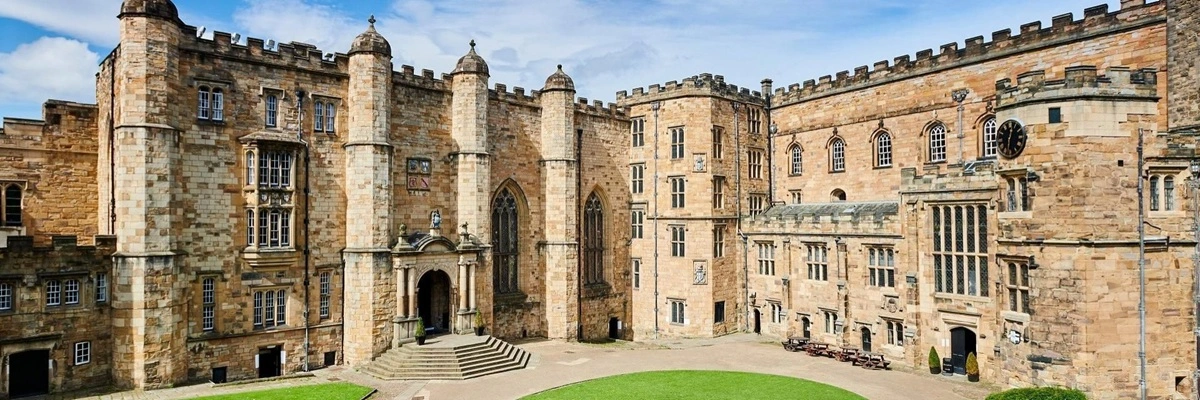
Durham University
United Kingdom
QS Ranking 2025
89
-11Guardian University Ranking 2024
7
-1Students Satisfaction
84%
Graduates Employability
93.4%
Int. Student Percentage
14%
Int. Fee Range
£22,000 to £35,000/pa
TEF Rating
Silver

Overview
Durham University is a collegiate public research university. Also known as The University of Durham. With its two-century-old service status, its functions are divided into the university’s academic departments and 17 more colleges under its supervision.
It is one of the founding members of the Russell Group. Thus, the university is considered a trusted study platform to get a worldwide recognised degree in business and management studies.
The University of Durham offers undergraduate, postgraduate, and research studies. Students are given a wide range of facilities, including modern libraries, computer labs, sports complexes, and numerous study spaces. The location of the university has also provided it with UNESCO World Heritage status.
Extended Overview
The collegiate public research university known as Durham University was formally founded in 1837 and was established by an Act of Parliament in 1832. It is located in Durham, England. The academic departments and the seventeen colleges make up the bulk of the university's operations.
Colleges promote students' well-being and personal development by providing housing, pastoral care, and a strong feeling of community, while departments are responsible for research and teaching.
The top institutions in the United Kingdom that focus on research are known as the Russell Group, and Durham is one of their members. According to the QS World University Rankings 2025, it is 89th among the world's top universities, a trend that continues year after year. With nineteen of its twenty-five academic departments placed in the top 100 worldwide, the university's educational support is well-known among student and alumni members.
Durham, being a historic city, is among the few universities having UNESCO World Heritage designation. Reflecting their historical and cultural relevance, the University's Castle and Durham Cathedral—two essential components of its estate—have been named UNESCO World Heritage sites.
According to QS, Durham is one of the top 100 institutions globally in terms of employer reputation, and the university's Employability & Careers team is particularly excellent.
Durham has a wealth of extracurricular activities and experiences beyond the classroom that can help you build an impressive set of transferable skills that will be an asset in any job you pursue after graduation. At Durham University, you'll have plenty of opportunities to hone your leadership, communication, problem-solving, and collaboration chops.
Durham University offers a variety of general support services, such as financial aid, university childcare support, and the Durham University Service for Students with Disabilities.
The university's libraries are open all day, every day. Across both campuses, the Information Technology Service provides networked services through more than 1,200 PCs in various classes and open-access areas.
The Durham University Overseas Study Centre, located on Queen's Campus, provides International Foundation Year and Pre-Masters study options for overseas students who wish to prepare for undergraduate or postgraduate degrees at Durham University.
Mission Statement
Durham University seeks to enhance lives and transform the world through the promotion of education. They accomplish this by motivating and assisting staff and students to generate and disseminate information, hence improving comprehension on both local and global scales.
The university emphasises five core values: inclusivity, integrity, collaboration, commitment to excellence, and citizenship for the benefit of current and future generations.
History
Durham University, founded by an Act of Parliament in 1832 and incorporated by royal charter in 1837, is one of the oldest universities in England. It awarded its first degree on June 8, 18371.
The university's origins can be traced back to mediaeval times when Durham College, Oxford, was established around 1286 for monks from Durham Abbey.
In 1541, Henry VIII proposed founding a northern university in Durham, but the plans were scaled down to a grammar school. The university was formally established in the 19th century and has since grown significantly.
From 1870, it was divided between Durham and Newcastle upon Tyne, with a fully federal arrangement from 1910 until 1963, when the Newcastle division became the University of Newcastle upon Tyne.
In 1992, Durham University established a new campus in Stockton-on-Tees, which was integrated with the main campus in Durham in 2017. The university's grounds have been recognised as a UNESCO World Heritage Site, historical landmarks, and other listed structures. Currently, Durham University is a distinguished institution recognised for its scholarly quality and extensive history.
Accreditation
- Association of Chartered Certified Accountants (ACCA)
- Association of MBAs (AMBA)
- Association to Advance Collegiate Schools of Business (AACSB International)
- Bar Standards Board (BSB)
- BCS, the Chartered Institute for IT
- British Psychological Society (BPS)
- Chartered Institute of Management Accountants (CIMA)
- Chartered Institution of Highways and Transportation (CIHT)
- Chartered Management Institute (CMI)
- Department for Education (DfE)
- European Foundation for Management Development (EFMD-EQUIS)
- Geological Society
- Institute of Chartered Accountants in England and Wales (ICAEW)
- Institute of Highway Engineers (IHE)
- Institute of Measurement and Control (InstMC)
- Institute of Physics (IOP)
- Institution of Chemical Engineers (IChemE)
- Institution of Civil Engineers (ICE)
- Institution of Engineering and Technology (IET)
- Institution of Mechanical Engineers (IMechE)
- Institution of Structural Engineers (IStructE)
- Royal Aeronautical Society (RAeS)
- Royal Society of Chemistry (RSC)
Campus Facilities
Here are some of the main campus facilities that students can experience while studying at Durham University.
- A library that includes a huge collection of books, online journals, articles, and modern machines with a large study area for effective learning.
- On-campus student accommodation that includes utility bills, gym support, bike parking, and laundry facilities.
- Recreational places inside campus include common areas, bars, cafes, and many more social places for students to relax and socialise.
- There is art and music theatre inside campus, including orchestras, choirs, and theatre companies.
- Multiple sport activities for students to stay mentally and physically fit. The campus has an indoor sports hall, specialised training areas, and gym rooms for different genders.
- There is a fencing sale for students to do fencing practice.
- Ergo Gallery for rowing training.
- There is a martial arts training session called Dojo.
- An indoor cricket centre for practising.
- A versatile indoor sports centre that features activities like squash, badminton, basketball, volleyball, and 5-a-side football.
- Outdoor sports include hockey, football, rugby, cricket fields with both artificial and grass wickets, tennis and netball courts, and a long athletics track for track and field events.
Courses
Durham University currently offers over 120 undergraduate courses, not to mention postgraduate degrees, both taught and research. They are:
Foundation
- Accounting and Finance
- Accounting and Management
- Anthropology
- Archaeology
- Biological Sciences
- Business and Management
- Business, Economics, Accounting and Finance
- Chinese Studies (with Year Abroad)
- Classics
- Computer Science
- Criminology
- Economics
- Education Studies
- English
- Finance
- Geography
- Health and Human Sciences
- History
- Humanities, Law and Social Sciences
- Japanese Studies (with Year Abroad)
- Law
- Liberal Arts
- Marketing and Management
- Music
- Philosophy
- Politics
- Primary Education
- Psychological and Behavioural Science
- Psychology
- Science and Engineering
- Social Sciences (Combined)
- Sociology
- Sport, Exercise and Physical Activity
- Theology and Religion
Undergraduate
- Accounting
- Accounting and Finance
- Accounting and Finance (with Foundation)
- Accounting and Finance (with Placement Year)
- Accounting and Finance (with Study Abroad)
- Accounting and Management
- Accounting and Management (with Foundation)
- Accounting and Management (with Placement Year)
- Accounting and Management (with Study Abroad)
- Accounting with Placement Year
- Accounting with Study Abroad
- Aeronautical Engineering
- Ancient History
- Ancient History and Archaeology
- Ancient, Medieval and Modern History
- Anthropology
- Anthropology (3 Years)
- Anthropology (with Foundation)
- Anthropology and Archaeology
- Anthropology and Sociology
- Anthropology with Foundation (4 Years)
- Archaeology
- Archaeology (3 Years)
- Archaeology (wIth Foundation) Sep 2025
- Archaeology (with Foundation) (1 Year)
- Archaeology and Ancient Civilisations
- Biochemistry
- Biological Sciences
- Biological Sciences (with Foundation)
- Biosciences
- Business and Management
- Business and Management (with Foundation)
- Business and Management (with Placement Year)
- Business and Management (with Study Abroad)
- Chemistry
- Chemistry (4 Years)
- Chemistry (Industrial Route)
- Chemistry (International Route)
- Chinese Studies (with Year Abroad)
- Chinese Studies (with Year Abroad) (with Foundation)
- Classic (with Foundation)
- Classical Civilisation
- Classics
- Climate Science
- Computer Science (3 Years)
- Computer Science (4 Years)
- Computer Science (with Foundation)
- Computer Science and Mathematics
- Criminology
- Criminology (with Foundation)
- Earth Sciences
- Economics (3 Years)
- Economics (with Foundation)
- Economics (with Placement Year)
- Economics (with Study Abroad)
- Economics and Mathematics
- Economics and Politics (3 Years)
- Economics with Management (3 Years)
- Economics with Management (with Placement Year) (4 Years)
- Economics with Management (with Study Abroad)
- Economics with Politics
- Education Studies
- Education Studies - Geography
- Education Studies - Psychology
- Education Studies - Sociology
- Education Studies (with Foundation)
- Engineering (Bioengineering)
- Engineering (Civil)
- Engineering (Civil) (3 Years)
- Engineering (Civil) (4 Years)
- Engineering (Electrical)
- Engineering (Electronic)
- Engineering (Electronic) (4 Years)
- Engineering (Mechanical)
- Engineering (Mechanical) (3 Years)
- Engineering (Mechanical) (4 Years)
- Engineering (Renewable Energy)
- English (with Foundation)
- English Literature
- English Literature and History
- English Literature and Philosophy
- Environmental Geoscience
- Finance
- Finance (with Foundation)
- Finance with Placement Year
- Finance with Study Abroad
- General Engineering
- Geography
- Geography (3 Years)
- Geography (with Foundation)
- Geology
- Geophysics
- Geoscience
- Health and Human Sciences
- Health and Human Sciences (with Foundation)
- Historical Archaeology
- History
- International Relations
- Japanese Studies (with Year Abroad)
- Japanese Studies (with Year Abroad) (with Foundation)
- Law
- Law (with Foundation)
- Liberal Arts
- Liberal Arts (with Foundation)
- Marketing and Management
- Marketing and Management (with Foundation)
- Marketing and Management (with Placement Year)
- Marketing and Management (with Study Abroad)
- Mathematics
- Mathematics (4 Years)
- Mathematics and Statistics
- Mathematics and Statistics (3 Years)
- Modern European Languages and History (with Year Abroad)
- Modern Languages and Cultures (with Year Abroad)
- Music
- Music (with Foundation)
- Music and Philosophy
- Natural Sciences
- Natural Sciences (3 Years)
- Philosophy
- Philosophy (with Foundation)
- Philosophy and Politics
- Philosophy and Psychology
- Philosophy and Theology
- Philosophy, Politics and Economics
- Physics
- Physics (3 Years)
- Physics and Astronomy
- Politics
- Politics (3 Years)
- Politics (with Foundation)
- Politics and International Relations
- Primary Education
- Primary Education (with Foundation)
- Psychological and Behavioural Science (3 Years)
- Psychological and Behavioural Science (with Foundation)
- Psychology
- Psychology (with Foundation)
- Psychology and Anthropology
- Religion, Society and Culture
- Social Sciences (Combined)
- Social Sciences (with Foundation)
- Social Sciences with Foundation (Combined)
- Sociology
- Sociology (with Foundation)
- Sport and Exercise Sciences
- Sport, Exercise and Physical Activity
- Sport, Exercise and Physical Activity (with Foundation)
- Theology and Religion (3 Years)
- Theology and Religion (with Foundation)
- Theoretical Physics
- Visual Arts and Film
- Pre-Masters
- Business, Economics, Accounting and Finance -
- Business, Economics, Accounting and Finance (2 Terms)
- Science and Engineering
Postgraduate
- Accounting
- Advanced Computer Science
- Advanced Computer Science (Artificial Intelligence)
- Advanced Mechanical Engineering
- Anthropology
- Arab World Studies
- Archaeology
- Behavioural Economics
- Behavioural Science
- Behavioural Science (Research Methods)
- Bioarchaeology
- Bioinformatics and Biological Modelling
- Biology
- Biomedical Engineering
- Biosciences
- Biotechnology
- Business Administration (Online)
- Business Analytics
- Catholic Theology (Distance Learning)
- Catholic Theology (Distance Learning) (1 Year)
- Catholic Theology (Distance Learning) (2 Years)
- Chemistry
- Chemistry (Industrial Route)
- Civil Engineering
- Classics
- Climate, Risk and Society
- Climate, Risk and Society (1 Year)
- Cognitive Neuroscience
- Conflict Prevention and Peacebuilding
- Conservation of Archaeological & Museum Objects (Diss)
- Conservation of Archaeological and Museum Objects (PP)
- Corporate Law
- Creative Writing
- Criminology and Criminal Justice
- Data Science
- Data Science (Digital Humanities)
- Data Science (Health)
- Data Science (Heritage)
- Data Science (Social Analytics)
- Defence, Development and Diplomacy
- Developmental Psychology (Research Methods)
- Developmental Psychopathology
- Earth and Environment
- Economics
- Education
- Educational Leadership and Change
- Electrical Engineering
- Electronic Engineering
- Energy Engineering Management
- English
- English Literary Studies
- Environmental and Natural Resource Economics
- Environmental Hazards and Risk
- Environmental Hazards and Risk (1 Year)
- Environmental Humanities
- European Trade and Commercial Law
- Finance
- Finance (Accounting and Finance)
- Finance (Corporate and International Finance)
- Finance (Economics and Finance)
- Finance (Finance and Investment)
- Finance (Financial Technology and Banking)
- Forensic Archaeology and Anthropology
- Geography
- Geography (Research Methods)
- Global and Planetary Health
- Global History
- History
- History (1 Year)
- Human Bioarchaeology and Palaeopathology
- Human Resource Management
- Intellectual Property Law
- Intercultural Communication and Education
- International Business
- International Cultural Heritage Management
- International Dispute Resolution
- International Environmental Law
- International Law and Governance
- International Relations
- International Relations (East Asia)
- International Relations (European)
- International Trade and Commercial Law
- Languages, Literatures and Cultures
- Law and Finance
- Laws
- Management
- Management (Entrepreneurship)
- Management (Finance)
- Management (Supply Chain Logistics)
- Marketing
- Mathematical Sciences
- Mathematics
- MBA
- Medical Anthropology
- Medical Anthropology (1 Year)
- Medical Humanities
- Medical Humanities (Online)
- Medical Humanities (Online) (9 Months)
- Medical Humanities (Online) (1 Year)
- Medical Law and Ethics
- Medieval and Early Modern Studies
- Museum and Artefact Studies
- Music
- Particles, Strings and Cosmology
- Philosophy
- Philosophy (1 Year)
- Physical Activity, Health and Society
- Physical Education
- Physics
- Plant Biotechnology and Enterprise
- Politics and International Relations (Political Theory)
- Politics and International Relations of the Middle East (1 Year)
- Politics, International Relations, Security (Research Methods)
- Public Policy
- Renewable and Sustainable Energy
- Research Methods
- Risk, Security and Politics
- Scientific Computing and Data Analysis (Astrophysics)
- Scientific Computing and Data Analysis (Computer Vision and Robotics)
- Scientific Computing and Data Analysis (Earth and Environmental Sciences)
- Scientific Computing and Data Analysis (Financial Technology)
- Secondary - MFL
- Social and Economic History (Research Methods)
- Social Research Methods
- Social Work
- Socio-Cultural Anthropology
- Sociology
- Supply Chain Management (Executive)
- Sustainability, Energy and Development
- TESOL and Applied Linguistics
- Theology and Religion
- Theology and Religion (9 Months)
- Translation Studies
- Visual Culture
Research/PhD
- Modern Languages and Cultures
Divisions and Departments
Durham University academics are divided into several faculties and departments, each focusing on different academic programmes. Here are the main divisions and departments of Durham University:
Faculty of Arts and Humanities
- Classics and Ancient History
- English Studies
- History
- Music
- Philosophy
- School of Modern Languages & Cultures
- Theology & Religion
Faculty of Science
- Biosciences
- Chemistry
- Computer Science
- Earth Sciences
- Engineering
- Mathematical Sciences
- Physics
- Psychology
Faculty of Social Sciences and Health
- Anthropology
- Archaeology
- Business School
- Education
- Geography
- Government and International Affairs
- Law
- Sociology
Combined Honours and Common Awards
- Flexible programs merging subjects from a range of departments
- Common Awards Framework for Theology, Ministry, and Mission
Faculty and Staff
Durham University consists of expert and specialised faculty members. The institution and its spaces are managed by
- Joe Docherty, Lay Member and Chair of the Council
- Jonathan Bewes, Lay Member
- Richard Dale, Lay Member
- Leslie Ferrar, Lay Member and Deputy Chairman
- Oliver Foster, Lay Member
- James Grierson, Lay Member
- Professor Denise Lievesley, Lay Member
- Professor Karen O'Brien, Vice-Chancellor and Warden. Ex officio member of Council
- Professor Mike Shipman, Deputy Vice-Chancellor and Provost, Ex officio member of Council
- Philip Plyming, Dean of Durham, Ex officio member of Council
- Rebecca Askew, Appointed Member of the University Staff
- Professor Amir Michael, Appointed Member of the University Staff
- Professor Ari Sadanandom, Appointed Member of the Staff
- Professor Konstantinos Nikolopoulos, Professor in Business Systems and Analytics
- Frederic Delmar, Professor Level 2, Innovation and Entrepreneurship.
- Brice Dattee, Associate Professor, Strategy and Business Models.
- Dr Gretchen Larsen, Associate Professor in Marketing
- Professor Mike Nicholson, Professor (Teaching) in Retail Marketing, Director of Education (Management and Marketing)
- Professor Sarah Xiao, Professor in Marketing & Programme Director, Fudan DBA Department of Management & Marketing
- Professor Andrew Parker, Professor in Leadership.
- Professor Konstantinos Nikolopoulos, Professor in Business Systems and Analytics
- Michael Anthonisz, Assistant Professor in Marketing / Durham-EBS Programme Director
- Brian Gibbs, Durham-EBS Programme Director
- Dr Peter Hamilton, Associate Professor in Human Resource Management
- Professor Pablo Munoz-Roman, Associate Professor in Operations Management
- Dr Joanna Berry, Associate Professor (Teaching) in Entrepreneurship
Student Life
As a student of Durham University, you would be able to experience a unique British culture that is totally different from any big city. Durham is known as a spectacular cathedral city with an amazing heritage and tonnes of activities for students to experience.
Here are highlights of the things a student can experience during their study term at Durham University and its surrounding areas.
- Students get to experience a diverse study system from Durham University’s collegiate system with 17 colleges working under this academic institution. Each of these colleges provides a sense of community and a variety of activities to participate in and learn new skills. This includes social, cultural and research activities
- With the inclusion of over 200 student societies maintained by Durham University student unions, enrolled students can engage in a wide range of extracurricular activities. This includes sports, drama, music, art, theatre performance, debate clubs, etc.
- Students can visit local pubs, bars, and restaurants, helping them socialise with others and build new friendships. The city of Durham gets lively on weekends with various nightclubs for students that stay open until late at night.
- Besides the bustling nightlife, the city also organises yearly events and festivals, decorating the city with colourful outfits during special holidays such as Christmas, New Year's Eve, Saint Patrick's Day, Halloween, etc
- The university has incorporated a separate student support office at all of its college and campus locations in support of the well-being of the students.
- International students can work part-time on campus and off campus. The university has a career support and job recruitment section where students can find suitable jobs of their desire and also link with big industrial recruiters.
Student Statistics
- Undergraduate: 78%
- Postgraduate: 22%
- Full-time students: 95%
- Part-time students: 5%
- UK students: 70%
- EU students: 04%
- International students: 26%
- Female: 54%
- Male: 46%
- First year: 44%
- Others: 56%
Transportation
Similar to other top cities, Durham also offers all the necessary transport options for its residents and students to commute to various locations. The roads are well-structured with bus routes spread across the city and its surrounding areas.
The intercity local bus services are available throughout Durham, giving an easy route to travel places. Students get discounted fares on local bus service by showing a valid UK university student ID card.
There is also a taxi service running inside the city, which is expensive compared to other public transport, but it is a more convenient way of travel, and students tend to share the taxi ride in groups and divide the fare among them, saving both money and time while they travel. Some taxi companies offer you fixed prices on travelling to specific destinations, such as airports and train stations or nearby cities.
The city has a train station that connects to all the major cities, such as Newcastle, Manchester, Edinburgh, Birmingham, London, etc. Students living in Durham can apply for a 16-25 Railcard, which offers a 1/3 discount on rail fares across the UK.
Similar to Liverpool, the city of Durham is also bicycle-friendly, with dedicated cycle lanes constructed on all the major roads. Students can cycle their way to short locations and basically move around the city by cycling with ease.
There are multiple bike rentals and cycle parking areas inside the campus areas of Durham University. Additionally getting student discounts on the cycling rentals as well.
In short, as the city is compact, walking to commute can be the best option for many students living in close quarters. Walking not only helps you to fulfil your daily cardio. But also provides the best way to visit locations and explore Durham in detail.
Housing and Accommodation
Durham University offers a variety of housing and accommodation options for students. Here's a breakdown of the available options and their costs:
On-Campus Accommodation:
- Standard Room (shared bathroom facilities): £183.23 per week.
- Ensuite Room: £200.03 per week
- Studio Room (New Kepier Court): £229.95 per week
- Single Mezzanine Studio or Super Studio Room (New Kepier Court): £274.58 per week.
Off-Campus Accommodation
For students who prefer to live off-campus, there are several private student accommodations available in Durham. Here are some examples:
- Elvet Studios: From £286 per week
- Chapel Heights: From £275 per week
- Regatta Place: From £180 per week
- Duresme Court: From £275 per week
- Houghall Court: From £228 per week
Private Student Living Costs
Living costs in private housing can vary depending on the location and type of accommodation. Here are some estimated costs:
- Rent: £3,500 to £6,000 per semester
- Utilities (gas, electric, water, broadband): £50 to £100 per month
- Food and household shopping: £100 to £200 per month
- Mobile phone: £10 to £50 per month
- Travel: £1.50 per day for unlimited bus travel within the Durham District Zone
Extracurricular Activities
Durham University offers a wide range of extracurricular activities for their students to boost the university experience, helping them build social networks and develop additional skills. Here are some of the extracurricular activities that you can do.
- In sports, Durham University has over 50 sporting activities that students can participate in, including traditional team sports, individual sports, and adventure sports.
- The university’s music sector has over 80 student-led music societies, ranging from orchestras and choirs to bands and solo performances.
- There are 27 theatre companies across the university, offering numerous opportunities to get involved in acting, directing, and production.
- Volunteering work is available for personal skill development. Students can engage in 50 annual community, educational, and recreational projects through student volunteering. Join the student media scene with opportunities in radio, television, and print journalism.
- Students who have a keen interest and are born talented in virtual gaming will be able to join in esports and gaming events organised by the Durham University Esports and Gaming Society.
- The university offers visual arts societies, dance societies, and more, with over 20 visual arts societies to choose from. Students can join these societies.
- The institution also organises events on enterprise and employment, giving students the opportunity to get involved in student-led events, work-study opportunities, and start-up companies to kickstart their careers.
- Students enrolled at Durham University Attend guest lectures, engage in academic activities beyond their degree course, and participate in dissertation "open mic" nights.
- Students can take part in dining as a community, celebration events, faith societies, peer mentoring, and more. To build good networks and communities.
Partnerships and Collaborations
Durham University maintains strong economic and strategic relations with its partners and collaborations across the globe. Here are some key partnerships and collaborations
- Accenture
- Airbus
- Boeing
- Diageo
- P&G
- Hitachi
- EY
- SAGE
- Association of Commonwealth Universities (ACU)
- European University Association (EUA)
- N8 Research Partnership
- Universities UK
- Matariki Network of Universities (MNU)
- Coimbra Group
- Matariki Network
- The Alan Turing Institute
Research Opportunities
Offering a wide range of research options across various disciplines, Durham University provides strong support to its students in building their future careers through specialised career services. Here are some of the key research opportunities available
- Durham University provides several research degrees, including MA (Master of Arts), MSc (Master of Science), MLitt (Master of Letters), MPhil (Master of Philosophy), MRes (Master of Research), and PhD (Doctor of Philosophy)
- Durham University has established Doctoral Training Partnerships (DTPs) in collaboration with private and public sector organizations. These partnerships provide outstanding training and research opportunities for postgraduate students.
- Durham University is home to several research institutes and centres that focus on interdisciplinary research. They are the Institute of Advanced Study, Wolfson Research Institute for Health and Wellbeing, Durham Energy Institute & Institute of Medieval and Early Modern Studies.
- The university also offers study options in research and business collaborations by conducting innovative and impactful research that transforms lives and makes a difference globally and locally.
- Durham University provides cutting-edge facilities and services to facilitate research endeavours. These encompass sophisticated labs, libraries, and computational resources.
Fees and Scholarships
Durham University offers a range of tuition fees depending on the level of study and the student's residency status. Here's a breakdown:
Tuition Fees:
Undergraduate
- UK Students: £9,535 per year.
- International Students: range from £20,500 to £30,000 per year.
Postgraduate
- UK Students: Fees vary by course, typically ranging from £5,000 to £15,000 per year.
- International Students: Fees range from £20,000 to £35,000 per year, depending on the course.
Research
- UK Students: £5,006 per year (classroom-based) & £5,006 per year (Laboratory-based)
- International Students: £25,500 per year (classroom-based) & £30,750 (Laboratory-based)
Scholarships:
Durham University provides a range of scholarships to assist students from diverse origins and academic standings. Below are the latest scholarship offerings from Durham University:
- Vice-Chancellor's Scholarships: Up to £2,000 per year for students with exceptional academic achievements.
- Durham Inspired North East Scholarships: Up to £4,000 per year for students from the North East of England.
- Khodorkovsky Scholarships: up to the full payment of tuition fees, stipend, visa costs, etc for Russian students.
- Sports Scholarships: Amounts vary based on the sport and level of achievement.
- Chevening Scholarships: Covers tuition fees, living expenses, and other allowances.
- Commonwealth Scholarships: Covers tuition fees, living expenses, and travel costs for students coming from Commonwealth countries
- Durham University Business School Scholarships: Amounts vary by program, typically up to £10,000 for students pursuing business-related postgraduate programs
- British Council Women in STEM Scholarships: Up to £20,000 for female students from Mexico pursuing master's studies.
- Chinese Scholarship Council: Covers part of tuition fees and living expenses for Chinese students pursuing PhD degrees.
- Colfuturo Scholarships: Up to 80% of the total cost of the program for students with Colombian residency.
- Durham Doctoral Studentships: Covers full tuition fees and provides a stipend for living expenses for students pursuing research degrees.
- Commonwealth Shared Scholarships: Covers tuition fees, living expenses, and travel costs for students from eligible Commonwealth countries pursuing specific master's programs
Alumni Network
Durham University's alumni network is as rich as its 200 years of academic heritage. Here is a list of notable alumni members who started their career journey from Durham University.
- Richard Dannatt, Chief of the General Staff
- Rosemary Coogan, British ESA astronaut
- Tim Smit, founder of the Eden Project
- Harold Evans, editor of The Times and The Sunday Times
- Jonathan Edwards, Olympic gold medallist
- Karen Aplin (Trevs), Professor of Space Science and Technology, University of Bristol
- Emma Chapman), Dorothy Hodgkin Research Fellow at Imperial College London
- Lucien Hardy, a researcher at the Perimeter Institute for Theoretical Physics
- Gordon D. Love, Professor of Computer Science and Physics at the University of Leeds
- Brian Scarlett , Professor of Chemical Technology at Delft University of Technology (1983–2000)
- Caleb Scharf, Director of the Columbia Astrobiology Center at Columbia University
- Rebecca Goss, Professor of Organic Chemistry at University of St. Andrews
- Michael Jarrett, Professor of Archaeology at Cardiff University
- Sue Black, Professor of Computer Science and Technology Evangelist at Durham University
- David Gavaghan, Professor of Computational Biology at the University of Oxford
- Ewan Anderson, Emeritus Professor of Geopolitics at Durham
- Gareth Stansfield, Professor of Middle East Studies at the University of Exeter
- H. Martyn Evans, Professor in Humanities in Medicine at Durham University; Principal of Trevelyan College (2008–2019)
- Frank Kelly, Mathematician and former Master of Christ's College, Cambridge
- Jo Fox, Director of the Institute of Historical Research
- Dominic Montserrat, British Egyptologist and papyrologist
- Andy Wood, Professor of Social History at Durham University
- Benjamin Woolley, historian and biographer
- Richard Ovenden, Bodley's Librarian at Oxford University
Career Services
In order to provide the best career service, Durham University has established the Career, Employability, and Enterprise Centre. This centre mainly focuses on helping students and graduates make their career decisions and take their next steps towards establishing a successful career.
Their services include:
- Career planning assistance and guidance on choosing the right career and making solid future plans.
- Conducts workshops and induction classes to help develop student’s skill development.
- Work experience enhancement programs such as providing students with internships, placements, and part-time job opportunities.
- An application assistance support to support students in writing their own CVs and cover letters and preparing for interviews.
- University and student unions organise regular career fairs, employer presentations, and networking events to connect students with potential employers.
- The university provides confidential one-to-one support and deals with each student differently while respecting the privacy of service users and disclosing personal information only with consent.
- More free career services include access to job listings on university job centres and free resources and lectures on self-development.
Awards and Recognitions
Durham University has received numerous awards and recognitions for its academic excellence, research contributions, and student achievements. Here are some notable ones:
- Academic Awards and Prizes: Each year, Durham University presents a range of undergraduate scholarships, prizes, bursaries, and awards to recognise outstanding academic achievements.
- Durham Global Awards: These awards celebrate staff and students who have made outstanding contributions to Durham's global reputation, culture, and impact. There are ten award categories, including the Global Curriculum Award, Global Student Experience Award, and Global College Award.
- Student Employee of the Year (SEOTY) Awards: These awards celebrate students who successfully balance part-time work with their studies, as well as employers who provide valuable work experience. Categories include "Above & Beyond," "Step Up to Leadership," and "Employer of the Year".
- University Rankings: Durham University holds prestigious positions in various university rankings. It is ranked 78th in the QS World University Ranking for 2024, 27th on the European stage, and 7th in both the Times Good University Guide and the Guardian University Guide for 2024.
Rankings and Achievements
Durham University has constantly ranked high in various global and national league tables, and the current year is no exception, as the university continues to achieve higher rankings compared to other UK universities of its category. Here are some of the notable rankings:
- 5th in the Times University Guide 2025
- 6th in the Guardian University Guide 2025
- 89th in the QS World University Rankings 2025
- 172nd in the Times Higher Education World University Rankings 2024
- Ranked 7th out of 130 universities in the UK by Complete University Guide 2025
Location
Durham is a historic city located in the northeast of England, approximately 12 miles southwest of Sunderland and 103 miles southeast of Edinburgh. The city has been recognised as a World Heritage Site for its stunning Norman architecture. A river named Wear passes through the city, giving the place a scenic beauty, and it is perfect for a visit or stay.
Durham University is located in the main city of Durham. Students studying here can enjoy visiting various attractions. The main attraction is the Durham Cathedral, situated a close walk to Durham Castle. Both of these historical landmark buildings are UNESCO Heritage Sites.
Durham Cathedral is a prime example of Gothic architecture. It features the earliest surviving stone vault of such scale in the world and the use of stone ribbed vaulting forming pointed arches. The city is compact, and students can plan to visit the Beamish Museum, Raby Castle, and Durham University Botanic Garden in a single day.
Leisure places at Durham include Hamsterley Forest, Seaham Harbour Marina, Dand Durham Riverside Walk. These places are ideal for walking, cycling and picnicking, giving visitors a scenic walk along the River Wear. You can also visit Durham Climbing Centre if you fancy indoor rock climbing.
Durham has multiple shopping centres, most notably Northgate Mall, Brightleaf Square, and Westgate Shopping Centre, providing students with a variety of shops to do shopping and obtain services.
For traditional groceries, students from different diversities can visit Moroleon Supermarket, Little India, and Part & Package free & Buld grocery stores to find their choice of traditional and specialised imported items.
The city also has several museums and art galleries, such as the Durham University Oriental Museum, The Bowes Museum, the 21c Museum Hotel, etc. Also, the city council hosts various yearly events and celebration nights.
These festivals include the Durham Miners Gala, the Durham Brass Festival, the Durham Book Festival, and the Durham Christmas Festival. Making the city of Durham a lively place for international students and its residents.
Gallery
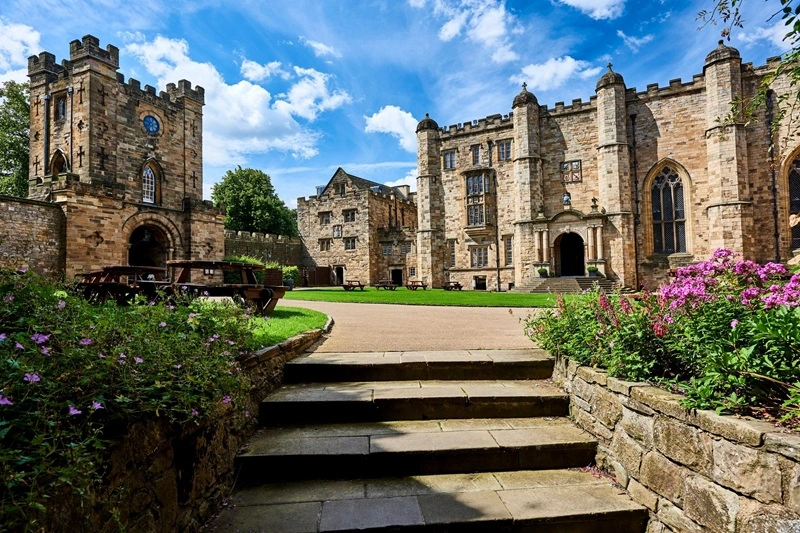
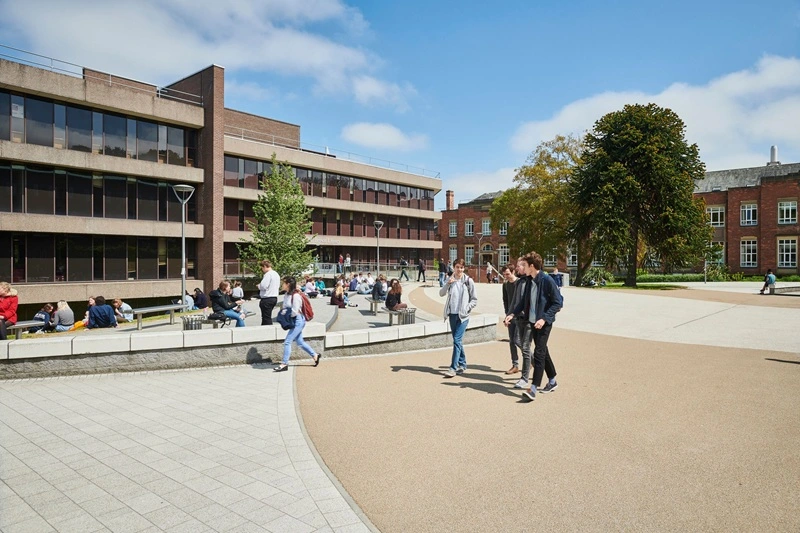
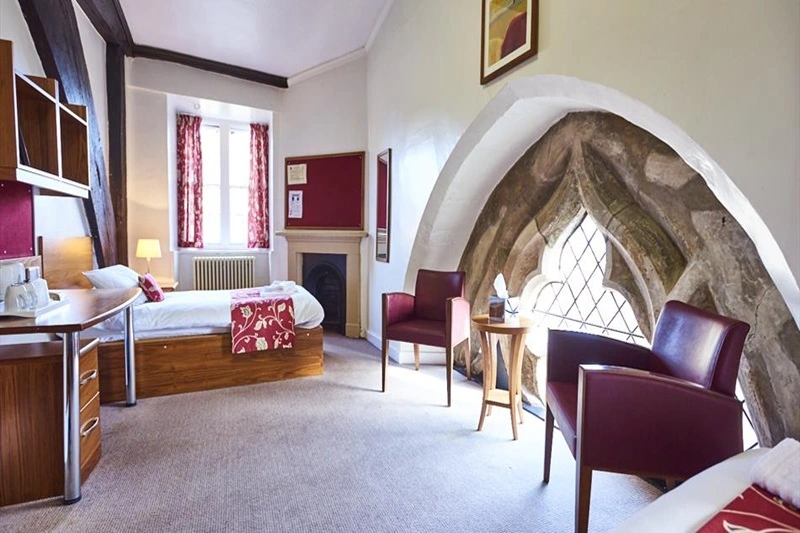

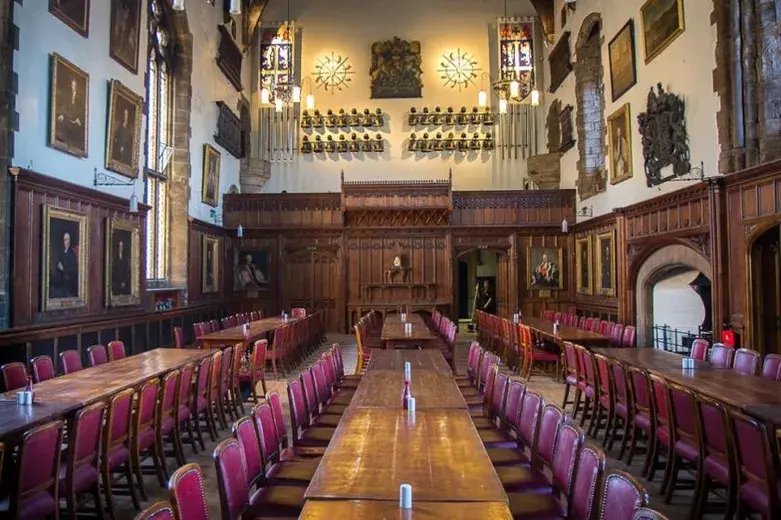
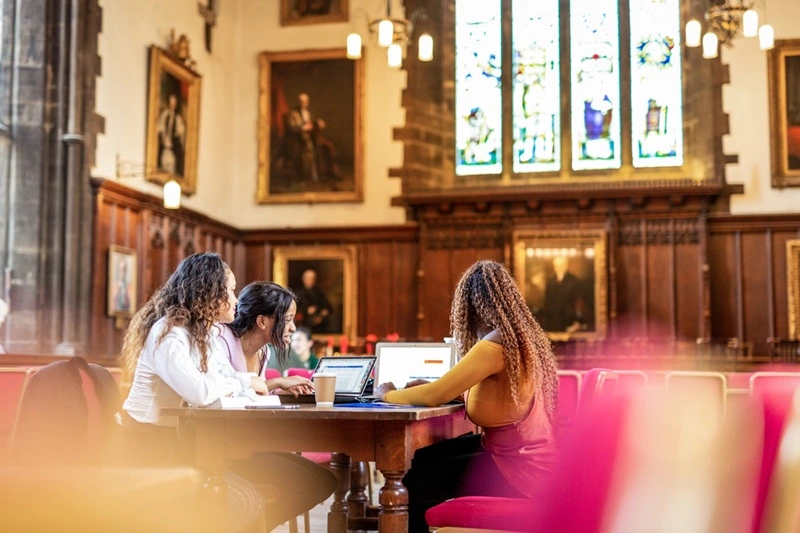
Courses
Frequently asked questions
Durham University is located in the historic city of Durham, in North East England.